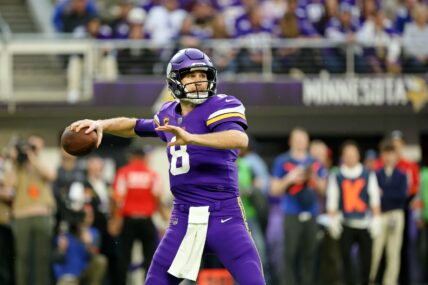The Vital Salary Cap Detail Vikings Fans Should Fully Understand

In the NFL, the annual average of a contract often means very little. Unlike the NHL where the deals are basically guaranteed, NFL deals routinely include numbers that never make it off the spreadsheet and into the player’s bank account. It’s a detail Vikings fans need to remember.
Kirk Cousins, for instance, has lived in perpetual controversy due to his proclivity for large, fully guaranteed deals. Kwesi Adofo-Mensah recently took on this subject, explaining that the team is looking for greater flexibility. Per Ben Goessling, the GM explained that the two sides are looking for different things in the contract: “Obviously from their side, they want it as certain as possible, and from our side, we want flexibility.”
At present, Cousins’ deal leaves Minnesota with very little ability to shuffle things around (the flexibility the GM is seeking). Cousins is heading for a fully guaranteed $36.25 million hit in 2023, leaving the team with a small amount of leverage when negotiating a new deal.
The hope, of course, is that the team and player can find a mutually beneficial solution, likely through an extension that keeps Mr. Cousins in town for at least a few more years.

On the other side of things is a QB like Derek Carr, who is currently a free agent. Last offseason, he signed a deal that actually exceeded Cousins’ annual average. Carr’s deal came in above $40 million per season whereas Cousins has never had more than a $35 million per year average.
The critical difference that must always be remembered, though, is the guaranteed money. Especially if we’re talking about full guarantees.

If we simply isolated annual average, Carr came in above Cousins. When we look at the actual strain on a team’s budget from year-to-year, Cousins comes in far above Carr.
The Raiders had to account for just $19.375 million on their cap last year due to Carr. They then moved on from their QB while only leaving behind a relatively modest $5.625 million. Last season, Cousins carried a cap hit a bit below $31.5 million. Cutting Cousins, unlike Carr, would leave behind a monstrous $48.75 million cap hit.
So, which one was more expensive? Carr’s annual average says it’s him, but the actual reality of the cap points to a different conclusion.
The broader points, folks, is that annual average isn’t a particularly helpful measure of a player’s actual contract impact. A player can average $50 million per season but if none of the money is guaranteed, a team can move on without consequence whenever they want. That team can also squeeze that player for an adjusted deal since the lack of guarantees leaves the individual player with very little leverage.
As you hear about the inevitable extensions, restructures, and new signings, keep in mind that the annual average often isn’t a particularly helpful measure of a contract’s true value.
Editor’s Note: Information from Over the Cap helped with this piece.

